WASHINGTON—Treasury Secretary Jacob Lew on Wednesday expressed
concern that "last-minute brinkmanship" in Congress would lead to a
legislative "accident" in which lawmakers fail to raise the debt
ceiling before a Nov. 3 deadline.
The tight timing is forcing Republican leaders in Congress to
search for a way to prevent an unprecedented government default.
The Treasury Department says it will be unable to pay the nation's
bills in just two weeks.
The standoff is rippling through financial markets as investors
this week reduced their exposure to Treasury bills that mature in
November, driving yields on such short-term debts to levels last
seen two years ago, when Congress went through a similar
episode.
The Treasury bumped against the borrowing limit in March and has
used emergency steps to free up cash since then.
Raising the debt limit always has been unpopular with the party
that doesn't control the White House. The vote has become
especially contentious in recent years as conservatives use the
issue as leverage to win policy concessions from President Barack
Obama. Mr. Obama has said he won't negotiate on the debt limit, a
precedent struck during separate standoffs in 2013 and 2014.
But the circumstances this time differ in several important
respects.
Republicans find themselves distracted by leadership turmoil
after House Speaker John Boehner said he would resign at the end of
this month, under pressure from conservative lawmakers.
And Republicans have added to their congressional majorities
since 2014, increasing the ranks of lawmakers disinclined to vote
in favor of lifting the debt limit.
Assuming every Democrat approves a "clean" debt-limit increase
that doesn't include spending cuts or other caveats, some 30 House
Republicans' votes would be needed to pass the bill. Last year, the
measure attracted votes from 28 House Republicans. Of those, nine
have left Congress.
GOP aides are nervous about finding the necessary votes this
time, but lawmakers say they are confident the House will
ultimately find a way to raise the debt ceiling. Resolving the
issue is at the top of Mr. Boehner's list before he leaves
Congress, a senior House GOP aide said Wednesday.
Raising the debt limit doesn't authorize spending on new
government programs. It allows the government to pay debts for
items where Congress already approved spending.
"I view not defaulting on our obligation as one of the single
most important things that one must do in Congress," said Rep. Ryan
Costello, a freshman Republican from Pennsylvania. Mr. Costello
said that while he would like to see spending reductions paired
with any debt-ceiling increase, the Senate and Mr. Obama are likely
to block such demands. "We're going to have to have a backup
strategy," he said. "The reality is you can't default. That money's
been spent."
House Republicans will make the first move, likely passing at
week's end legislation including a host of GOP demands that
Democrats will block in the Senate. As the standoff approaches the
Nov. 3 deadline, GOP leaders will likely have to turn to their
least appealing option: relying on Democratic votes to increase the
debt limit without any policy concessions.
In their first concrete proposal this week, House Republicans
offered a package that would raise the debt limit to $19.6 trillion
from its current level of $18.1 trillion while enacting large cuts
to spending on safety-net programs that they proposed in their
budget this spring. It would also force a vote on a balanced-budget
pact, among other changes to the budget process.
"This forces Congress to do its job and take those
transformational budgets and put them into action," said Rep. Bill
Flores (R., Texas).
It is unlikely to advance in the Senate, where Republicans
control 54 seats but need 60 votes to overcome procedural
hurdles.
Some Republicans also oppose it, a sign of the potentially
chaotic endgame. The GOP bill is "clearly going nowhere," said Rep.
Tom Reed (R., N.Y.). He said he doesn't like the proposal because
it was sprung on members at the last second and short circuits
budget-process overhauls that are already in the works.
House Republicans on Wednesday voted to pass a separate bill
that would allow the Treasury to pay interest to bondholders and
Social Security payments without an increase in the debt limit. It
also isn't expected to advance in the Senate.
The Treasury called the plan "default by another name" last week
because it would delay payments—in violation of federal law—to a
broad swath of government operations, including federal workers,
contractors and soldiers, once the government runs out of cash.
"The basic political math suggests that Republicans have no good
options other than raising the debt ceiling," said Brian Gardner, a
political analyst at investment bank Keefe, Bruyette & Woods
Inc. The debt prioritization bill is a "political disaster" that
exposes Republicans to claims that they "put Chinese bondholders
ahead of U.S. veterans," he said.
Reduced demand for U.S. securities that results from debt-limit
standoffs costs the government money. In 2011, uncertainty about
raising the debt limit cost the government around $1.3 billion,
according to a study by the Government Accountability Office, an
independent investigative arm of Congress.
Many of the worst fears from past debt-limit standoffs haven't
been realized. Deficits have declined in part because of ultralow
borrowing costs and the U.S. economic recovery, while frustrating,
has nevertheless become the envy of many rich nations. The Treasury
said last week the U.S. budget deficit in the year ended Sept. 30
fell to its lowest level since 2007.
Siobhan Hughes and Richard Rubin contributed to this
article.
Write to Nick Timiraos at nick.timiraos@wsj.com and Kristina
Peterson at kristina.peterson@wsj.com
Subscribe to WSJ: http://online.wsj.com?mod=djnwires
(END) Dow Jones Newswires
October 21, 2015 21:05 ET (01:05 GMT)
Copyright (c) 2015 Dow Jones & Company, Inc.
Treasury Group Ltd (ASX:TRG)
Historical Stock Chart
From Apr 2024 to May 2024

Treasury Group Ltd (ASX:TRG)
Historical Stock Chart
From May 2023 to May 2024
